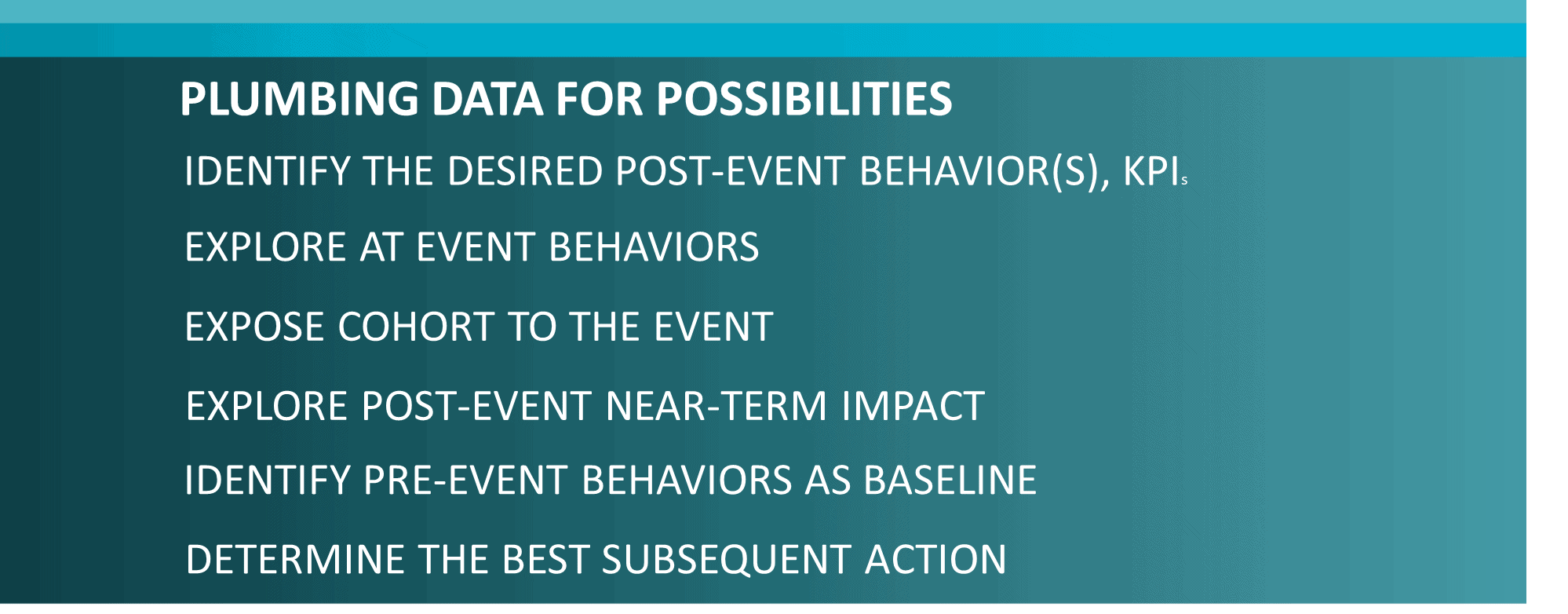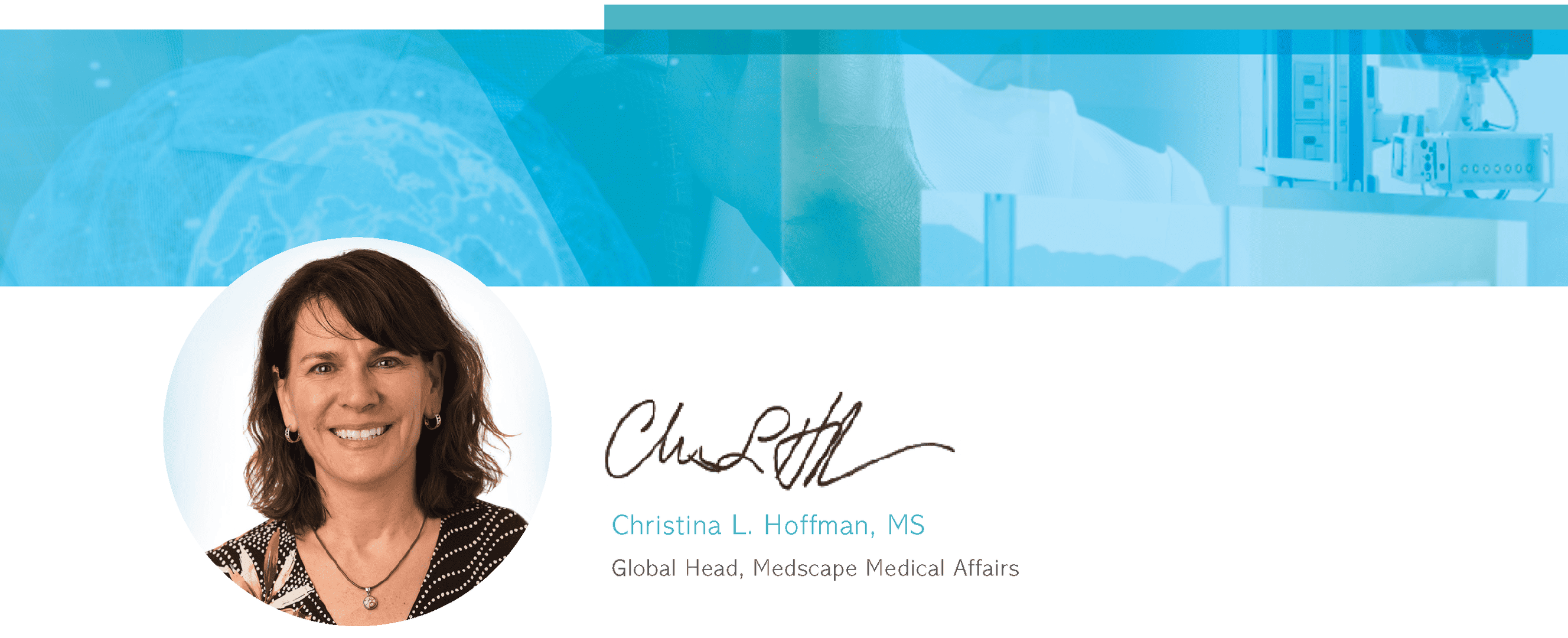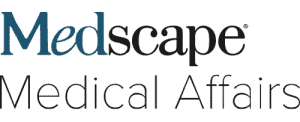Actionable Insights for Medical Affairs: Elusive or Within Reach?
November 22, 2022 | Data and Analytics, MSLs, Medical Communications, Pharma, medical affairs

Plato was right: Necessity is the mother of invention, and — in the case of Medical Affairs departments — the driving force behind their creation was the federally mandated separation of medical and commercial activities within drug companies. Yet, what may have begun as a hodgepodge of responsibilities has — due to evolving needs, the marketplace’s increasing dependence on big data, and even the pandemic — become a robust pillar of these same companies, with an extensive remit: nothing less, according to pharmaceutical consultant Caroline Horwood, than a “knowledge steward” and a company’s “single source of truth with data.” [1]
Thus, what started as an external-facing delivery of scientific and clinical information between drug companies and medical professionals, physicians, and patients has, in many cases, swelled into a 2-way torrent of communication to, from, and between internal and external stakeholders. “Fast-forward to 2022, and Medical Affairs is establishing the foundation upon which the road to commercial success is built.” Not surprisingly, that foundation is built on data, which “impacts just about everything a pharmaceutical company does, from sales to marketing, to portfolio planning.” [2]
Collecting and disseminating data — and directing both internal and external traffic at the intersection of research, business, and education — is a pivotal, if sometimes exhausting, position that necessitates productive and effective relationships with multiple stakeholders. That could mean anything and everything from responding to an individual patient’s drug queries to managing key opinion leaders (KOLs) who expect the Medical Affairs department to know everything about the science, the company, and the current/future development plans for a particular molecule, and beyond that to internal stakeholders who want to know everything about how KOLs feel consolidated into general statements.
MEASURING A MOUNTAIN OF NEEDS
Facing a seemingly limitless task, it’s natural to seek the best way to facilitate optimal collaboration between internal teams, physicians, and the broader medical community. And, further, if that mountain can be scaled, to want that collaboration to yield measurable results that validate the role(s) of, and the choices made by Medical Affairs departments.
As long as 2 decades ago, information technology analyst Douglas Laney observed that “big data” were growing in volume, velocity, and variety. [3; 4] Fifteen years later, it was noted that these same data required specific technology and analytical methods for their transformation into value. [5]
Today, Medical Affairs departments within the pharmaceutical industry must capture and interpret a rapidly increasing volume and variety of data, not only to produce valuable insights for internal and external stakeholders, but to maximize and measure the impact of its own actions. Thus, in this case, ROI stands for “return on intelligence,” whereby increases in knowledge are the units of measurement and gauge of success. [6] However, the challenge in measuring the impact of Medical Affairs is not a lack of data, but rather of analytics that help teams searching for patterns in the noise.
AS LEARNING DESIGNER QIAN FENG PUTS IT, “The proliferation of health data and innovation in technology necessitates rapid upskilling of digital capabilities for Medical Affairs. From accessing, collecting and aggregating novel sources of health data and insights to using advanced analytics and artificial intelligence to transform data into real-world evidence, digital fluency is a must-have for Medical Affairs to fill critical evidence gaps and demonstrate value for patients. This means Medical Affairs teams must adopt a continuous learning mindset to keep up to date with new technology and adapt to the digital way of life.” [7]
WHERE KPIs ARE KING
Another tactical element is the identification of the appropriate key performance indicators (KPIs) for a particular assessment. As futurist Bernard Marr notes, “most companies find it hard to select the right [KPIs] for their business and instead end up measuring and reporting a vast amount of information on everything that is easy to measure…. Or, sometimes they simply pick the KPIs everyone else seems to be using, regardless of whether or not those are useful for their business.” [8]
Today’s business landscape demands that leaders make better decisions, assess and fine-tune their performance, and maximize their agents’ potential and portfolio to leverage their competitive advantage. Now, more than ever, companies need to continually assess and adapt to stay on course, in real time and in the moment, “not just after the fact.… When properly understood and used effectively [KPIs] provide a powerful tool in achieving just that. Without them, organizations are simply sailing blind.” [8]
Using Medical Affairs-specific KPIs and metrics helps ensure the evaluation of data and evidence that matters, both to advise and support decisions. “In that way you can provide quantifiable data and measurable trends that reflect changes in your ability to share scientific knowledge with key opinion leaders.” [6]
HCP ACTIONS AND REACTIONS
Knowing how healthcare providers (HCPs) react to educational and marketplace events is key to understanding their needs — and identifying and bringing that knowledge back to the business is key to taking action to meet them. To do so requires robust information about the HCPs themselves so that their behaviors before, during, and after an event can be tied back to their interaction with it. Useful demographic information includes specialty, geographic location, number of patients with a specific diagnosis seen in a practice, and clinician treating habits. Real-time third-party data, such as International Classification of Diseases, 10th revision (ICD- 10), Healthcare Common Procedure Coding System/Current Procedural Terminology (HCPCS/CPT), and treatment codes (gathered in a class or market basket), along with information
gleaned from HCP engagement and knowledge transfer, also provide the raw material for analyses that can reveal patterns leading to actionable insights.
Currently, due in some part to the years-long pandemic, touchpoints for HCP engagement and knowledge transfer are trending more toward the “digi-verse” than traditional in-person interactions with sales reps and field medical teams; and HCPs are increasingly embracing the safety and convenience of digital, on-demand channels to consume medical information and educational content.
“THE PANDEMIC HAS IMPACTED THE HEALTHCARE INDUSTRY as well as the function of medical affairs in numerous ways and has brought new challenges and demands to tackle. There is indeed a silver lining due to intense digital transformation within this crisis. The emerging digital innovation and new technologies in healthcare, medical education and virtual communications are likely to stay and advance further.” [10]
Consequently, the complete and creative use of digital channels has become yet another area that demands Medical Affairs department expertise to yield actionable insights into how these channels can best be used to engage with HCPs, offer compelling information and engaging learning options, and capture data related to their beliefs and behaviors
to analyze, synthesize, and take back to the company. Importantly, these skills and their consequent insights also will increase the impact and effectiveness of medical science liaison (MSL) communications with KOLs.
Capturing and analyzing HCPs’ online search patterns can reveal what they want to know and can spur the development of relevant and meaningful content, while outcomes data from interactive online education can reveal prescriber’s’ rationale for selecting, rejecting, or discontinuing therapy.
Further, market assessment tools, including online surveys, can reveal practice patterns and identify healthcare disparities and barriers to healthcare such as access to treatment.
Stepping even deeper into the weeds, triangulating among carefully selected data points may expose behavior patterns of clinicians who do or do not behave as expected (or hoped for) following market event exposure.
The impact of marketplace events, including presentation and publication of pre- and post-marketing clinical trial and study results, publication of clinical practice guidelines, and approvals of new drugs, also can be measured and analyzed in relation to HCPs’ information-seeking behavior. Exposure to education may reveal periodic increases in search activity and activity consumption that may suggest gaps in knowledge related to precipitating marketplace events.
Taken together, when HCP information is deliberately gathered and thoroughly analyzed, it can be used to glean actionable insights that may support or revise medical strategy — including publication plans, clinical trials, and informational and educational strategies — and, ultimately, improve patient care and outcomes.

REVVING THE FIELD MEDICAL ENGINE
Such insights can also inform a strong strong field medical response — or detect a pattern of less optimal execution within individual, regional, or even a wider field medical impact. In a recent MSL Society (MSLS) podcast, Ralph Rewers, PharmD, National Director Anti-Infective/Virology/HCV Medical Science Liaisons, AbbVie, acknowledged and encapsulated the value of MSLs by noting that “There are very few functions within a company where you have people bringing information — from HCPs who are actually treating patients — back into the company… to either confirm medical strategy and alter or enhance that strategy.” [9] However, in the same podcast, MSLS CEO Samuel Dyer, PhD, cited a global survey showed 47% of MSLs do not fully understand the difference between something a key opinion leader shared and actionable insights.
Part of the difficulty was cited in the aforementioned De Mauro study: Transforming data into value requires a methodology for analysis. MSLs, in turn, need to develop best practices that employ a methodology and proper perspective so that they can recognize patterns and pathways to actionable insights — and that may require upskilling with training and education to fully realize their potential to the business.
A high-functioning MSL team is a powerful machine that can both fuel and drive Medical Affairs’ core deliverables to maximize patient experiences and outcomes, including:
- Lead rapid-cycle, integrated evidence generation supported by micro-analysis to tailor information to the needs of individual patients
- Clearly articulate clinical and economic value to build trust with all stakeholders and accelerate access to treatment
- Upgrade physician and patient decision-making by engaging providers, patients, and others with tailored information, supported by a reimagined insight-generation process
- Provide strategic medical direction to the organization, steering resources for maximum medical impact, injecting new capabilities, and upgrading performance at scale
In short, MSLs are part of the continuous, circular feedback loop that make Medical Affairs departments unique in their value to the companies and communities they serve. Their optimization is essential to speed adoption of cutting-edge medicines and devices, provide actionable insights, and fast-track engagement with external experts to accelerate the implementation of novel therapies.

MEDSCAPE MEDICAL AFFIARS: DATA AND ANALYTICS
With more than 25 years of experience — and access to more than 25 years of physician and consumer data — Medscape Medical Affairs (MMA) uses digital acumen and strategic thinking to build and facilitate cross-functional collaboration that adds value to the company and to the larger healthcare universe.
MMA’s skilled data scientists are able to plumb the depths of data to find patterns in health behaviors and recognize trends that identify and determine ways that clinical care and outcomes can be improved. Combining those abilities with its substantial medical, scientific, and education capabilities has led MMA to devise an astute suite of solutions that meshes seamlessly with its connection to more than 5 million physician members worldwide.
Those solutions have been honed by decades of experience and expertise across a multitude of therapeutic areas to:
- Create action-driving content in an array of expressions (slides, Medical Affairs booth support, FAQs, etc)
- Conduct “wrap-around analytics” before, during, and after an event to provide combined information and measurable insights
- Craft and employ longitudinal “perception surveys” to ascertain what clinicians think about a disease-state scenario or class of drugs, and find patterns in health behaviors to inform insights
- Analyze member behaviors to detect clinical practice patterns that deliver a story of impact supporting KPIs for Medical Affairs functions
- Engage with KOLs and other experts worldwide to accelerate the adoption of novel therapies
- Assess and equip field medical teams to work with international, national, and regional thought leaders

NAVIGATING INTO THE FUTURE
Knowing what needs to be done and having the internal, employed resources to get it done are two very different things. Given the span of remit, is it even possible to cover all training, education, and implementation needs internally? And, if so, is it money well spent when specialized, experienced partners are available to make it all happen?
To enable this most critical remit, it’s essential that Medical Affairs teams explore a strategic alliance with a best-in-class partner who has the proven expertise in both knowledge transfer and insight generation. Little can be achieved without that, making knowledge transfer and the timely delivery of robust, actionable, and evidence-based insights the most powerful and attainable elements to illuminate the path forward.
YOU CAN DOWNLOAD THIS WHITE PAPER HERE
Further articles and White Papers can be found here on our website
REFERENCES
- Horwood C, Stiewe S. Medical Affairs — The Future Strategists of the Pharma Industry? Research. July 20, 2021.Accessed April 5, 2022. https://uptakestrategies.com/medical-affairs-the-future-strategists-of-the-pharma-industry/
- ACMA. Medical Affairs Essentials: What is Medical Affairs? January 19, 2021. Accessed April 19, 2022. https://medicalaffairsspecialist. org/blog/what-is-medical-affairs
- Dash S, Shakyawar S, Sharma M, et al. Big data in healthcare; management, analysis and future prospects. J Big Data. 2019;6;54:1-25.
- Laney D. 3D Data Management: Controlling Data Volume, Velocity, and Variety. Application Delivery Strategies. META Group Inc; 2001.
- De Mauro A, Greco M, Grimaldi M. A formal definition of Big Data based on its essential features. Library Review. 2016;65;3:122-135.
- Laudano, J. Return on Intelligence — Medical Affairs ROI. Pharmaspectra. September 19, 2017. Accessed April 5, 2022. https://www. pharmaspectra.com/resources/features/return-on-intelligence-medical-affairs-roi/
- Feng Q, Knox J. Skills for the Future of Medical Affairs. L-TEN. September 24, 2021. Accessed April 5, 2022. https://www.l-ten.org/ focus/5-skills-for-the-future-of-medical-affairs/
- Marr B. What is a KPI? BernardMarr.com 2021 . Accessed April 19, 2022. https://bernardmarr.com/what-is-a-kpi/
- Medical Science Liaison Society (MSLS). MSL Insights. Improving KOL access through the use of effective insight gathering. June 19, 2020. Accessed May 15, 2021. https://members.themsls.org/page/KOLAccessUsingInisghtGathering
- Furtner D, Shinde PS, Sing M, Wong CH, Setia, S. Digital Transformation in Medical Affairs Sparked by the Pandemic: Insights and Learnings from COVID-19 Era and Beyond. Pharmaceutical Medicine 2022; 36:1-10.
This content was provided by Medscape Medical Affairs





